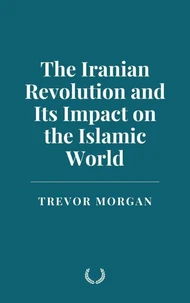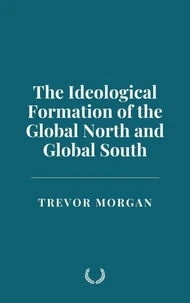The Economic and Political History of BRICS
Par :Formats :
Disponible dans votre compte client Decitre ou Furet du Nord dès validation de votre commande. Le format ePub est :
- Compatible avec une lecture sur My Vivlio (smartphone, tablette, ordinateur)
- Compatible avec une lecture sur liseuses Vivlio
- Pour les liseuses autres que Vivlio, vous devez utiliser le logiciel Adobe Digital Edition. Non compatible avec la lecture sur les liseuses Kindle, Remarkable et Sony
 , qui est-ce ?
, qui est-ce ?Notre partenaire de plateforme de lecture numérique où vous retrouverez l'ensemble de vos ebooks gratuitement
Pour en savoir plus sur nos ebooks, consultez notre aide en ligne ici
- FormatePub
- ISBN8230348719
- EAN9798230348719
- Date de parution28/01/2025
- Protection num.pas de protection
- Infos supplémentairesepub
- ÉditeurIndependently Published
Résumé
This book provides an in-depth analysis of the economic, political, and social history of BRICS (Brazil, Russia, India, China, and South Africa), exploring its emergence as a collective force in global governance. Tracing the origins of BRICS from its initial formation as a group of emerging economies to its current status as a significant global player, the book delves into the diverse political systems, economic models, and regional aspirations that shape the group's internal dynamics.
Through a comprehensive examination of historical contexts, key ideas, and primary sources, it highlights BRICS' efforts to challenge the Western-dominated international order, reform global financial institutions, and promote a more inclusive, multipolar global system. The book covers BRICS' contributions to global economic governance, such as the creation of the New Development Bank and the Contingent Reserve Arrangement, as well as its role in advocating for climate justice, sustainable development, and social inclusion.
It examines how the group has navigated internal challenges, including tensions between China's economic dominance and the diverse geopolitical interests of other members, while maintaining a commitment to multilateralism, sovereignty, and non-interference in global security. The book also addresses the ongoing challenges of balancing economic growth with environmental sustainability and tackling global issues such as poverty, inequality, and geopolitical rivalries.
By exploring BRICS' political and economic policies, its evolving role in global security, and its future prospects, this book provides valuable insights into the group's potential to shape the future of global governance. As BRICS seeks to create a more equitable world order, its legacy and future trajectory will have profound implications for the global political and economic landscape in the 21st century.
Through a comprehensive examination of historical contexts, key ideas, and primary sources, it highlights BRICS' efforts to challenge the Western-dominated international order, reform global financial institutions, and promote a more inclusive, multipolar global system. The book covers BRICS' contributions to global economic governance, such as the creation of the New Development Bank and the Contingent Reserve Arrangement, as well as its role in advocating for climate justice, sustainable development, and social inclusion.
It examines how the group has navigated internal challenges, including tensions between China's economic dominance and the diverse geopolitical interests of other members, while maintaining a commitment to multilateralism, sovereignty, and non-interference in global security. The book also addresses the ongoing challenges of balancing economic growth with environmental sustainability and tackling global issues such as poverty, inequality, and geopolitical rivalries.
By exploring BRICS' political and economic policies, its evolving role in global security, and its future prospects, this book provides valuable insights into the group's potential to shape the future of global governance. As BRICS seeks to create a more equitable world order, its legacy and future trajectory will have profound implications for the global political and economic landscape in the 21st century.
This book provides an in-depth analysis of the economic, political, and social history of BRICS (Brazil, Russia, India, China, and South Africa), exploring its emergence as a collective force in global governance. Tracing the origins of BRICS from its initial formation as a group of emerging economies to its current status as a significant global player, the book delves into the diverse political systems, economic models, and regional aspirations that shape the group's internal dynamics.
Through a comprehensive examination of historical contexts, key ideas, and primary sources, it highlights BRICS' efforts to challenge the Western-dominated international order, reform global financial institutions, and promote a more inclusive, multipolar global system. The book covers BRICS' contributions to global economic governance, such as the creation of the New Development Bank and the Contingent Reserve Arrangement, as well as its role in advocating for climate justice, sustainable development, and social inclusion.
It examines how the group has navigated internal challenges, including tensions between China's economic dominance and the diverse geopolitical interests of other members, while maintaining a commitment to multilateralism, sovereignty, and non-interference in global security. The book also addresses the ongoing challenges of balancing economic growth with environmental sustainability and tackling global issues such as poverty, inequality, and geopolitical rivalries.
By exploring BRICS' political and economic policies, its evolving role in global security, and its future prospects, this book provides valuable insights into the group's potential to shape the future of global governance. As BRICS seeks to create a more equitable world order, its legacy and future trajectory will have profound implications for the global political and economic landscape in the 21st century.
Through a comprehensive examination of historical contexts, key ideas, and primary sources, it highlights BRICS' efforts to challenge the Western-dominated international order, reform global financial institutions, and promote a more inclusive, multipolar global system. The book covers BRICS' contributions to global economic governance, such as the creation of the New Development Bank and the Contingent Reserve Arrangement, as well as its role in advocating for climate justice, sustainable development, and social inclusion.
It examines how the group has navigated internal challenges, including tensions between China's economic dominance and the diverse geopolitical interests of other members, while maintaining a commitment to multilateralism, sovereignty, and non-interference in global security. The book also addresses the ongoing challenges of balancing economic growth with environmental sustainability and tackling global issues such as poverty, inequality, and geopolitical rivalries.
By exploring BRICS' political and economic policies, its evolving role in global security, and its future prospects, this book provides valuable insights into the group's potential to shape the future of global governance. As BRICS seeks to create a more equitable world order, its legacy and future trajectory will have profound implications for the global political and economic landscape in the 21st century.






